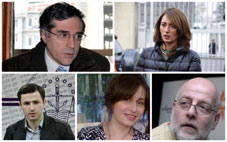
NGOs protest delay concerning eavesdropping
By Tatia Megeneishvili
Wednesday, October 29
The group working on the amendments with regard to eavesdropping addressed Parliament Speaker Davit Usupashvili on October 28.
The group is protesting the possible postponement of legal changes concerning eavesdropping until April 2015.
They stress that the delay is initiated by majority member Shalva Shavgulidze.
A parliament commission composed of lawmakers and NGOs have been working on the issue and a final solution over the problem should be made before November 1, 2014.
“Since we heard about the initiative, eight members of the working group, two MPs Nino Goguadze and Tamar Kordzaia among them, as well as the public defender, addressed the head of the Legal Affairs Committee Vakhtang Kmaladze and asked to call a meeting of the working group in order to discuss the current situation. However, our appeal failed and now we are addressing the parliament speaker,” reads a joint statement of the NGOs.
Executive Director of Transparency International Georgia (TI) Eka Gigauri estimated the situation as being unacceptable.
“The group members have already worked out a draft. This draft will ensure a new system and appears to be fruitful. We want Mr. Usupashvili to pay attention to the issue,” Gigauri said.
Director at the Human Rights Education and Monitoring Center (EMC) Vakhushti Menabde said that the strategy of postponement is used too often. “Recently we have observed a tendency that the government is trying to postpone everything, especially those things that are especially sensitive,” Menabde said.
Head of the International Society for Fair Elections and Democracy (ISFED) Nino Lomjaria states that the delay would serve the interests of the Ministry of Interior Affairs that wishes only it to have access to eavesdropping.
Currently, the Ministry of Internal affairs has direct access to eavesdropping. The approach is being criticized by NGOs. Several options have been discussed to resolve the problem. The most recent possible solution was a two-key system. It operates like a bank-style, when a safe key is given to a bank employee and a client. Thus, when it comes to eavesdropping, the key should be given both to the Ministry of Interior Affairs and to mobile operators. Herewith, only if there was a court order, the ministry would carry out the activity.


